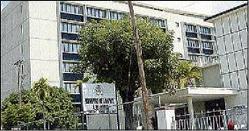Keith Collister, Business Writer

Dr. Omar Davies' domain, the Ministry of Finance, National Heroes Circle, Kingston. - File
International bond traders were very concerned last weekend about the potential impact of Hurricane Dean on Jamaica's economy, particularly its impact on our ability to repay our debt.
According to one of the leading traders in Jamaica's international Eurobonds, Oppenheimer's Greg Fisher, it was surprising that Jamaican Eurobonds were marked down only about half point (the same sort of marking down as for Ivan), over the trading period.
He expressed the post-'Dean' situation in his morning letter on Tuesday:
"Just as in the case of Hurricane Ivan, Hurricane Dean was headed straight for the city of Kingston as a very powerful Category Four hurricane on Sunday, only to veer south of the city just a few miles offshore at the last possible minute.
"It is truly amazing; both of these monster storms ('Ivan' and 'Dean'') somehow managed to swing wide of Jamaica just when most of the weather geeks had predicted a 'direct hit'," he continued.
A real bother
Fisher said the damage was less than expected. "Two horrendous storms; two near-misses; that's what I call divine intervention at its best."
He noted that already "We have seen some support come in from the locals" referring to buying by our local institutional investors. "Even though the markets (overall) are really nervous right now, Hurricane Dean is proving to be a real bother rather than a catastrophic event," Fisher summarised.
Bear Stearns' Dr. Carl Ross concurred, arguing that "Hurricane Dean was destructive, but not devastating" in a research note to clients on Monday. "We do not believe that this hurricane represents a meaningful credit event for Jamaica. Bond prices during Hurricane Ivan in 2004 fell by about one point before recovering quickly. We think the price reaction should be similarly muted this time around," he told the Financial Gleaner.
He added that the Government of Jamaica had received assurances of aid from several governments, including the United States (U.S.) the Caribbean Catastrophe Risk Insurance Facility appears not to have been triggered.
Addressing Jamaica's bond repayment of US$225 million due on September 1, Dr. Ross argued that in his view Jamaica would have preferred to access the markets to refinance this maturity, but was not able to do so due to the turmoil in the international market in recent weeks.
However, Dr. Ross did not foresee any risk of the bond not being repaid on time, based on the level of foreign exchange reserves at the Bank of Jamaica, and the country's demonstrated willingness to pay.
Head of fixed income for local broker, Stocks and Securities Ltd., Clinton Brooks agreed, noting that the government of Jamaica had been 'proactive' in coming to the market in March raising US$350 millionat an eight per cent coupon rate.This was US$100 million morethan the proposed initial issue of US$250 million, and had effectively pre-funded the US$225 million 11.75 per cent Eurobond maturing in 2007.
Dr. Ross noted last week that there were no deals globally in the emerging market world. The week before there had been about three or four deals globally, none of them being in Latin America. In such an environment, he does not see "any circumstances of international capital market access between now and September 1" for Jamaica.
In his view, absolute bond yields and their spreads over U.S. treasuries were temporarily high, so that most issuers, such as countries like Jamaica, would not want to issue bonds in this environment.
Investors do not want to look at deals because they may have too much risk. The environment is therefore one of no supply (investors don't want to issue) and no demand (investors don't want to buy), resulting in a market that is closed for new issues. Based on his experience, Dr. Ross noted that investors usually increase cash, either through not reinvesting interest or actually selling bonds in such periods.
Brooks noted that once the upcoming issue was repaid, the Government will have a break from international bond market repayments. "The Government's only need to raise capital will be to fund the €200 million issue which becomes due on February 11, 2009." He, however, noted that the Government may have other budgetary financing needs over the period.
Commenting on the trading of Jamaican bonds, Brooks said: "With the (passage) of Hurricane Dean, there were some "panic" selling by overseas holders, mainly on Monday and Tuesday; this created opportunities for local investors to get attractively priced bonds with higher yields."
Dr. Ross noted that during the emerging market correction, Jamaica had traded "right in the middle " of comparable single B countries, with countries such as Venezuela and Argentina falling more.
Referring to the prices of Jamaica's internationally traded Eurobonds on Wednesday, Brooks argued: "Barring other unforeseen circumstances, we should see a bottom for bond prices here, with prices moving up in the short to medium-term (we have seen bounces in 15s, 17s and 39s today) as things have settled down and the damage is not as bad as portrayed by media houses overseas."
Pan Caribbean's CEO, Donovan Perkins, believed that going forward "bond prices may reflect some softness as 'Dean' is a reminder of our vulnerability to weather and we still have several weeks before the season ends."
However, he appears relatively sanguine about 'Dean's' macro-economic consequences. Whilst he believed 'Dean' is likely to have some moderate inflationary impact, he did not expect an inflationary spiral, and still expected single digit inflation for the year.
He noted that history suggests that there might be some fall off in GCT tax receipts and higher government expenditure related to post hurricane recovery costs.
Perkins believed, however, that the local foreign exchange market should be relatively stable subject to the seasonality issues that normally arise in September as the "Bank of Jamaica is well armed".
keithcollister@cwjamaica.com

